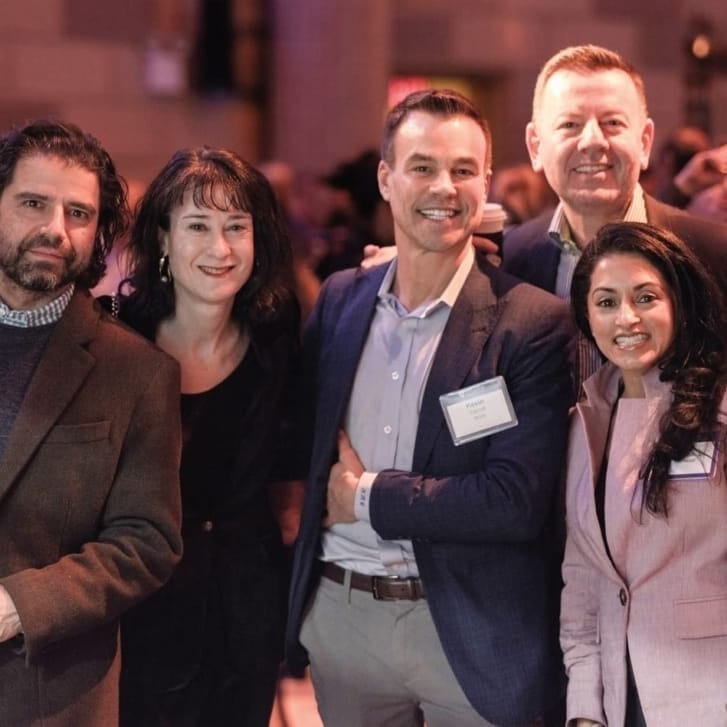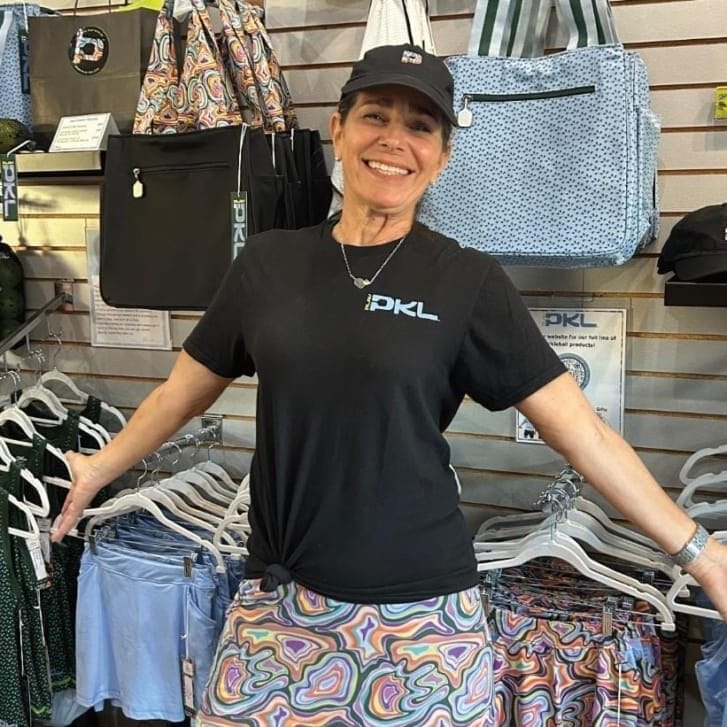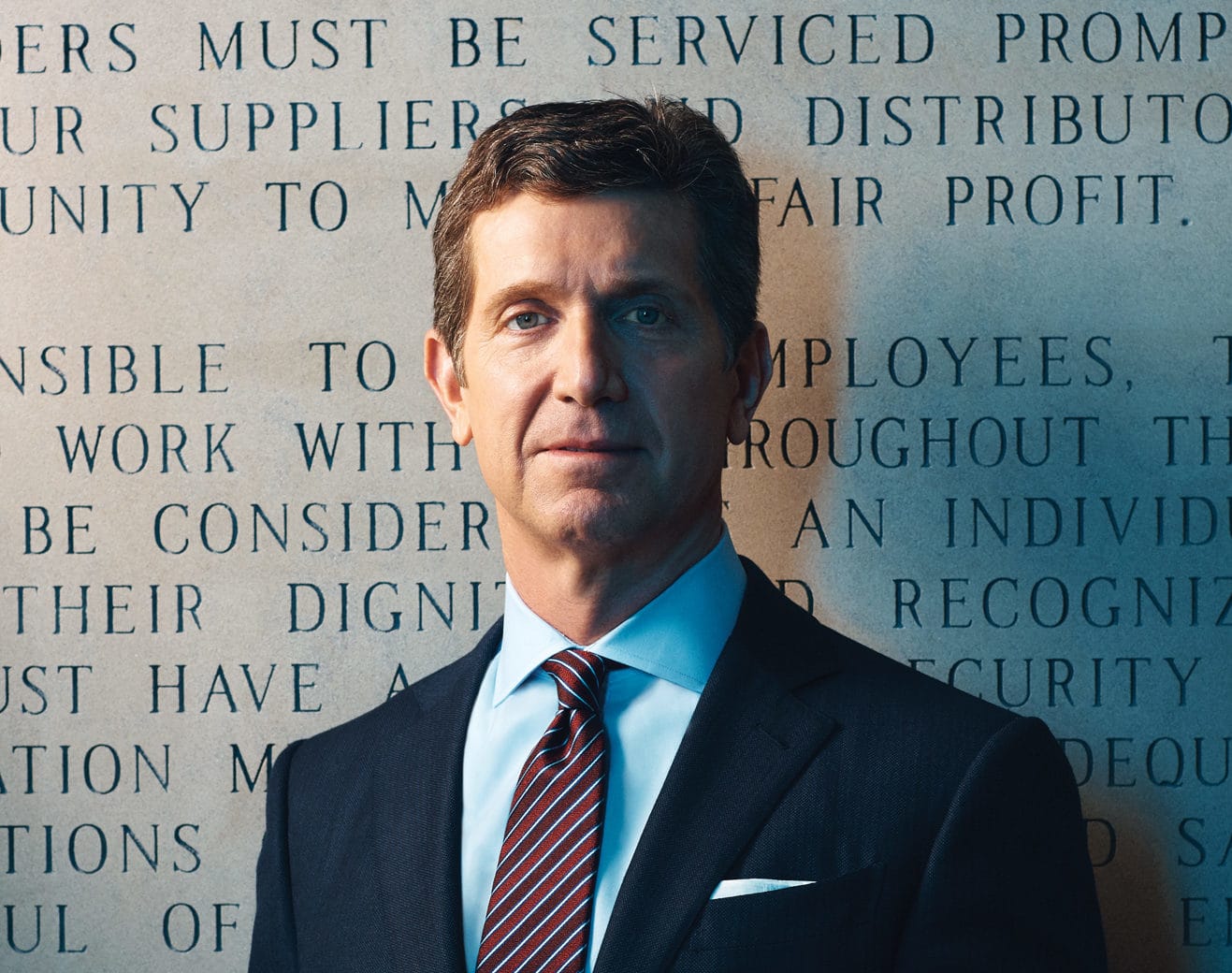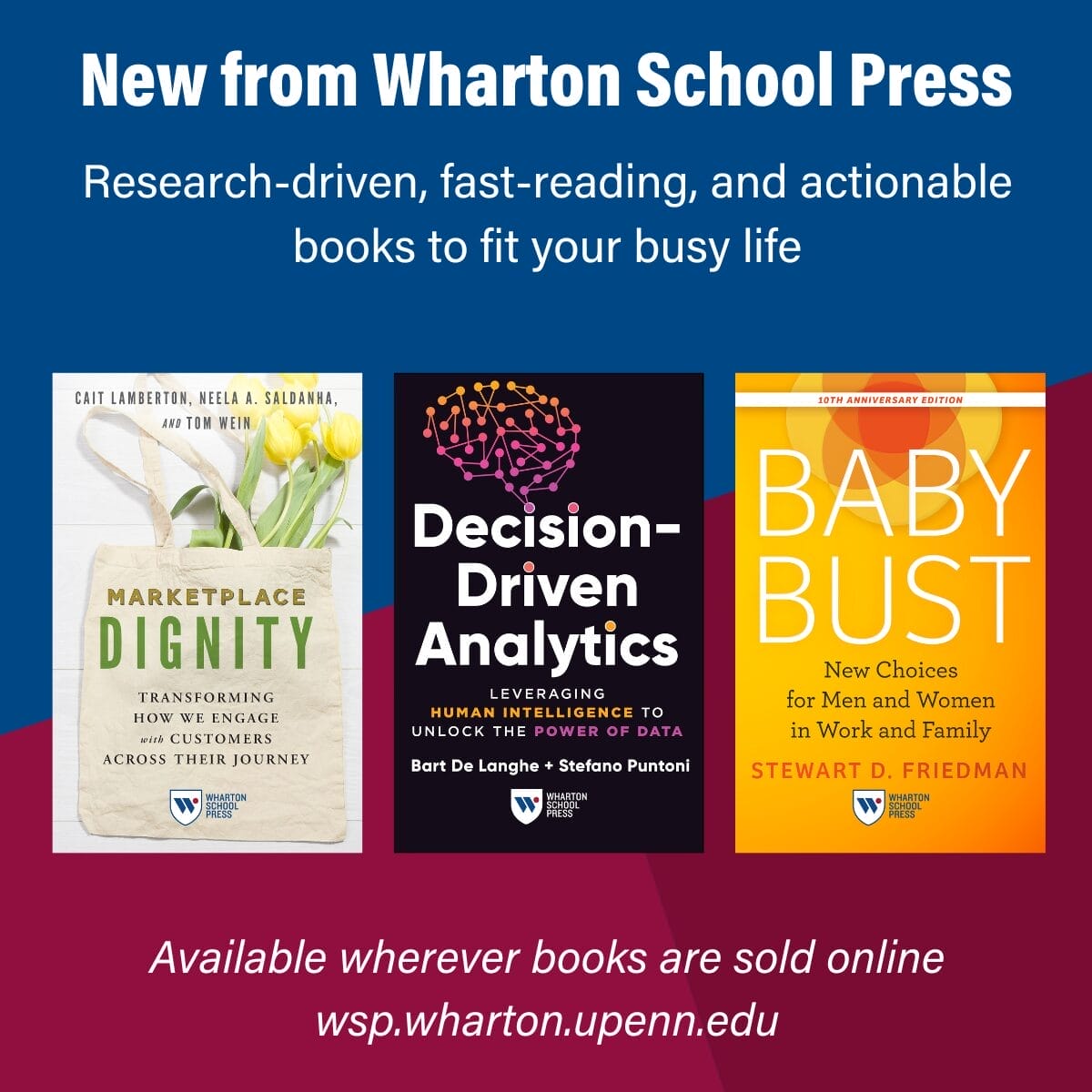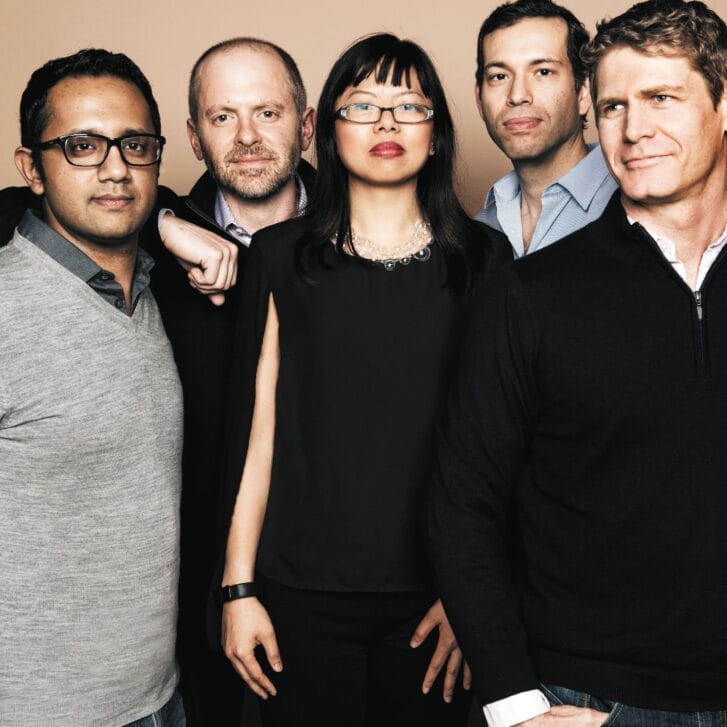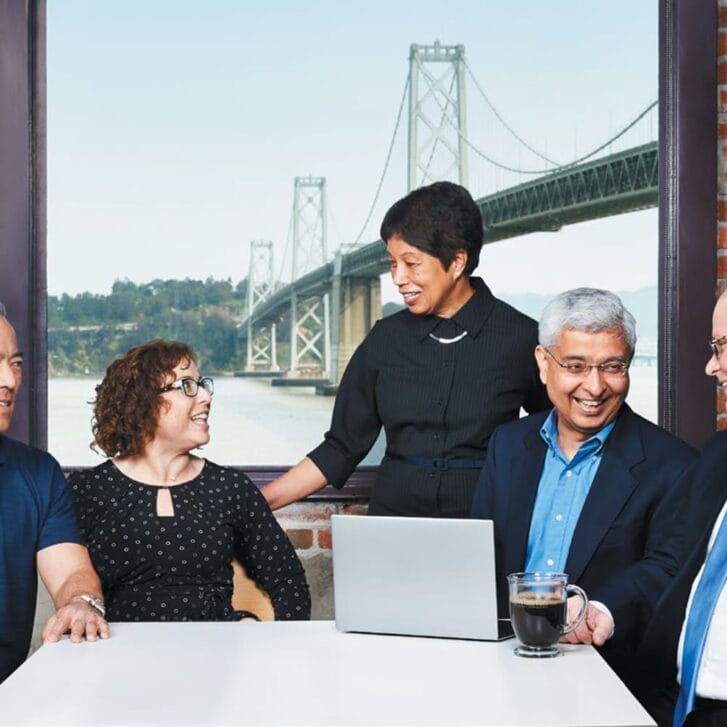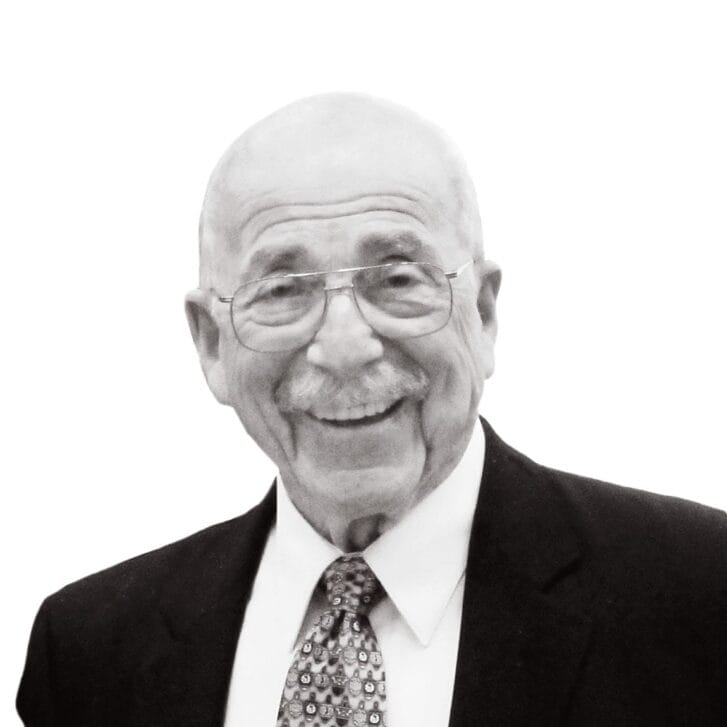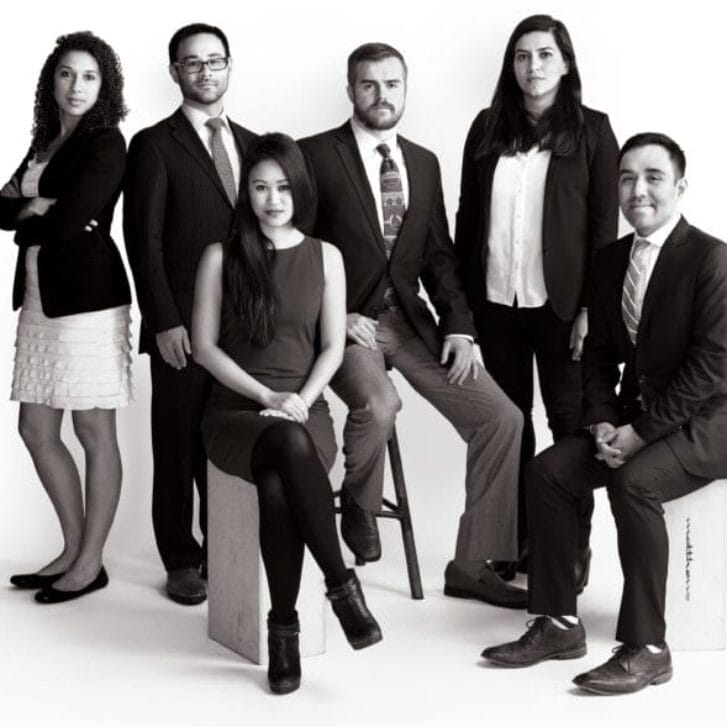Alex Gorsky, CEO of Johnson & Johnson, is still amazed by how close he still is with the members of his learning team from Wharton’s Executive MBA program, and how far they’ve each gone in their careers. In 1996, selecting a team was a little less scientific than it is today. “There were about 100 of us in a room, to be divided into 15 study groups based on where we lived, our background and how we got along,” said Gorsky. “As one of my classmates described it, it was a little bit like a cross between picking a dodgeball team when you were in high school and pin the tail on the donkey.” But from that day forward, the study group formed tight personal and professional relationships.
At first, it seemed, their careers couldn’t have been more varied. The group included Gorsky, a product director at Johnson & Johnson, an OB/gynecologist at Lehigh Valley Medical Center, a leader of a data processing company, a plant manager of a Pennsylvania automobile brake manufacturer, a Finance Professional from Johnson & Johnson, a product manager for Air Products and a controller for a furnace company.
They all brought something very different to the table. “I think we managed to not only take a lot away from the curriculum and the instructors, but we also had a great time,” he said. “All of us like to work hard and play hard. And we really learned how to work as a team and how to rely on each other. We all had a great sense of humor, which I think is so important in leadership.”
Since graduation, the group has stayed in touch, getting together at least once a year, no matter where they are geographically. “We’ve been to bat mitzvahs, bar mitzvahs, weddings, funerals—you name it. And we’re very proud of the fact that we’re all still such close friends. I’m also really proud of just how far everyone has gone,” he said.
The OB/gynecologist, Steve Klasko, is now chief executive of Thomas Jefferson University and Jefferson Health. Linda Johnson, who led the data processing company, is chief executive of the Brooklyn Public Library System for New York. Mike Pisch, who was the accountant at the furnace company, is a Venture CFO and has worked on multiple ventures; along the way Dave Buckley, who worked for the brake company, has been a CEO at several different successful ventures. Terry Hahn, the product manager for Air Products, now serves on the senior leadership team at Honeywell. And the J&J Finance Professional, Bert Bruce, now runs the Commercial Development & Community Engagement for the Global Rare Disease Business at Pfizer Inc.
Gorsky pauses, reflecting. “As our careers developed, we’ve all coached and mentored each other, and, in some cases, people have worked for each other and taken on ventures together, so there’s just been a tremendous amount of intersection between our personal and professional careers and lives. It’s really a talented, successful group of people that, frankly, I consider family, not only friends.”
Pivotal Career Moves
Gorsky chose Wharton’s Executive MBA degree to learn both the technical and the strategic skills that the MBA could provide. He was fortunate to have the full support of his leadership team at Johnson & Johnson.
He notes two crucial turning points in his career after Wharton that can be directly linked to his career’s success. The first was after he had been with Johnson & Johnson about 14 years and was approached about moving to Europe. “There was some risk to the decision. It meant relocating my family and learning about entirely different markets and many different health care systems, versus staying in a comfortable place where I had been for a long time. My son was heading into his freshman year of high school and that’s never an easy time to move,” he said.
Nevertheless, his family has a motto: it’s not good or bad, it’s just different, and they try to take on that mindset with everything they do. Their move to the United Kingdom proved to be a rewarding experience, both personally and professionally. “Professionally, I learned so much more about the business. As a family, it brought us closer together because you don’t have all the distractions and the weekend activities that you have here in the United States,” he said. They did more activities together, and his son had a good experience at an international school.
The second pivotal career point was returning to Johnson & Johnson. After working in Europe, he had taken a job with the Swiss-based company, Novartis, in the United States for four years, where he served as head of the company’s pharmaceuticals business in North America. The company did well under his leadership, and Gorsky said he learned a lot from the opportunity, but he returned to Johnson & Johnson four years later. “I always knew I wanted to come back and finish my career at Johnson & Johnson,” he said.
The CEO Selection Process
Gorsky had always aspired to earn a position of significant responsibility. When he was notified that he was one of two candidates to be the CEO of Johnson & Johnson, he said he was both was excited about the opportunity and humbled by that level of responsibility.
The in-depth CEO selection process in which he participated set a new standard. Gorsky said it was driven by the board of directors and involved strategic reviews about the businesses and the company’s future. It involved in-depth 360 reviews from managers over his entire career—from managers 20 years prior, to mentors and people he’d worked with along the way. Then he did individual interviews, team interviews and interviews with the entire board. “I felt that they had every opportunity to really understand who I am, who I had been, and what kind of a CEO I was likely to be going forward,” he said.
He said the selection process wasn’t so much about pitching himself for the position; it was more about explaining how he thought about the business, the company, the culture, about people and how he made decisions. Those characteristics and traits meant much more to the board than a pitch, per se. They had chosen him because of many different factors—including all the different businesses he had run. He’d begun his pharmaceutical career as a sales representative, and risen through the ranks in marketing and general management. He had served as the president of Janssen’s U.S. operations and had been responsible for its functional areas, which included everything from administration and community affairs to medical affairs. He also oversaw the launches of several drugs. He had left the company and had come back with outside knowledge, and he had a chance to run the pharmaceutical business in Europe, the Middle East, Africa and Russia and learn how the geographic locations affected the different markets.
Making Health Personal
His position as Chairman and CEO obviously takes endurance, and Gorsky lights up with enthusiasm as he talks about health and wellness. His square-shouldered physique hints of a disciplined routine, and, sure enough, he awakens at about 4:50 everyday, and after a quick cup of coffee and a splash of cold water on the face, his next stop is the gym, usually for 60 to 90 minutes. He does a combination of cardiovascular, weight training, swimming and cycling and still competes in triathlons; J&J is the primary sponsor of the Philly Tri-Rock, one of the premier triathlon festival weekends in the country. He has completed the race at least five times. “Last year, 600 people from our company participated and raised about half a million dollars. All you saw was a sea of red tee shirts flying across the trail,” he said, chuckling.

The event suits the company’s evolving mission. Johnson & Johnson is increasing its focus on wellness, and not just sick care. The company’s diversity of businesses gives him a unique perspective on the issue. He asserts that some 75 percent of chronic disease—such as cardiovascular disease, cancers, metabolic ailments, and pulmonary disease—can be significantly reduced by lifestyle and choices such as not smoking, not drinking too much, along with maintaining a healthy diet and a consistent exercise program.
“Jim Burke, one of my predecessors in the seventies, actually kicked off a wellness program at J&J called Live for Life,” he said. “And we’ve continued to build and improve upon that. Now, more than 90 percent of our employees know their vital statistics like their heart rate, blood pressure, cholesterol level—and it’s voluntary.” He adds: “If you know your data, you’re going to be more aware and tend to take it more seriously. Now more than 95 percent of our employees have access to fitness programs such as a fitness facility, healthy dining in the dining facility, exercise education, things like that. And we try to emphasize it in everything we do.”
As the world’s largest and most diversified health care company, he wants employees to make their health a personal experience, believing that taking care of themselves is the most important thing that they can do for themselves and their families. “These jobs are challenging,” he said. “You don’t have to run a marathon or do a triathlon, but I encourage everyone to really think about how they can carve out time to stay healthy.” The return on investment is enormous. “If you’re healthier, if you feel better, you’ll have more energy. You’ll be more present. And ultimately, what you don’t want is to spend your entire career working so hard, making all those sacrifices, and then have some health event that maybe could have been prevented had you taken better care of yourself.”
Advice on Distinguishing a Career
When others aspiring toward leadership positions ask him for advice, he tells them, “The most important thing is to distinguish yourself by having a consistent track record of demonstrated performance. I think, too often, people get caught up in the politics or the positioning, and I would say, of those three P’s, performance is, by far, the most important. If you have a very consistent track record of performance in different markets, different businesses, different business cycles. That’s really important.”
The second critical factor is a strong track record of developing people. Sometimes, he said, you’ll inherit a team. Your mission is to make the team better or turn it around completely.
Finally, you need the right value system incorporating trust, judgment, and resiliency.
Gorsky says his own values came from his life experiences. He was born as the fourth child in a family of six children with a 17-year spread. “Being part of a large, very middle-class family taught me a lot about how to work with others and how to get along,” he said. “Look, you’re the best person you know how to be. Companies and people don’t want perfection—they want real leaders they can identify with, whom they think have empathy, compassion; who aren’t afraid to set a high standard and challenge and debate. But at the end of the day, they want a real and authentic leader whom they know is going to be with them.”
Happily Uncomfortable
Before beginning his career, Gorsky spent six years in the military. He went to Ranger school and Airborne school, earning a Captain’s rank while serving in Panama, Europe, and the United States. “It taught me not to care about things like how high the wall is or how far across the river you need to swim—you’ve just got to figure out a way to solve the problem,” he said. “And you never have enough resources; things always happen that are unexpected.” While still in his early twenties, he was put into tough situations while learning to work with a diverse group of people. But then, an injury came back to haunt him.
When he was a boy cutting grass in his backyard near a lake in Michigan, he’d suddenly heard a sound and saw something cut into his shin. A doctor examined it and told him if there was an object lodged under his skin, it would eventually work its way out, and sent him off with a bandage.
About 10 years later, he was a cadet in the middle of Ranger school spending much of his time doing patrols, traversing different landscapes and setting up ambushes. Moving at night was safer than in the day, but when walking through the woods in the dark, he would repeatedly hit his shins on the downed trees. The frequent blows caused an infection in his lower leg. And it persisted, but the young cadet could only be out of Ranger school for 12 hours or he’d have to retake the course, which he didn’t have time to do. About a week before the end of Ranger school, his leg was too infected to go on. In the hospital, doctors discovered something remarkable. “When they took me in, they basically extracted a fish hook from my shin that had been there for 10 years,” he said. Eight hours after they sewed him up and administered antibiotics, he was back in the woods. And yes, he did his final patrol, passed and received his Ranger Tab along with his Airborne Wings.
He credits the military with helping him to develop resilience, one of the most important characteristics needed in the role of a CEO today. “Because, frankly, whatever organization or company, the reason that you’re there as a leader, is to manage though challenges and seize opportunities,” he said. “You need to be comfortable with being uncomfortable, to be able to face a series of challenges and crises at times, and to do it in an inspiring, non-robotic, real way. You need to maintain calm when there can be a lot of anxiety; to maintain perspective.”
First Days as CEO
When he took the helm as CEO in 2012, he focused on the culture of the organization. He made lists considering what would remain the same, evolve and change. For what would remain unchanged, he took inspiration from Johnson & Johnson’s Credo, and value system that is over 70 years old. It talks about the company’s commitment to patients, mothers and fathers, physicians and nurses that use its products; and its commitment to its employees, its communities, and ultimately, to its shareholders.
When it came to making changes, he knew he needed to elevate the bar for innovation— not only with products, but with innovation methods. “And I think we’ve become much more externally focused versus just internally focused on where we source a lot of our innovations,” Gorsky said. He accelerated the pace of change in the global organization; 49 percent of the company’s sales are now outside the United States. He placed a very strong emphasis on daily execution, and improved the quality systems and supply chain.
He also put an even greater emphasis on “leading with purpose.” In today’s world, he said, “both our stakeholders outside the company and our internal stakeholders, our employees—millennials in particular—want to be part of something bigger than themselves.”
Staying Engaged
CEOs must learn constantly, ask questions and stay connected and engaged to keep a hand on the pulse of their organizations. And as a result, they gain increased perspective. “I always say a couple of things happen when you become a CEO,” Gorsky said. “The news tends to become very good or very bad and your jokes can get very funny. If you’re not constantly seeking out information, it’s easy to become very insular in your decision making. I put a lot of time, energy and effort into connecting,” said Gorsky.
Johnson & Johnson has an employee blog that functions as a two-way conversation. In addition, Gorsky holds numerous town hall meetings where he tries to engage with people at all levels of the organization. He also makes one-to-one telephone calls. “I call 10 people each week, to connect deeper down in the organization with skip-level meetings,” he said.
Every two years, the company does a comprehensive survey, of all 127,000 of its employees. More than 90 percent respond. The survey asks employees to evaluate how the company is meeting its Credo responsibilities. It uses the feedback to evaluate its businesses and leaders. “If you’re a business leader, our expectation is that you not only deliver strong business results, but that you set the right tone, the right climate, the right culture in your organization that fulfills our Credo obligations overall,” said Gorsky.
During the last Credo survey, J&J identified three areas for improvement: innovation, collaboration and talent development. When it takes the leadership team to Korea, for example, they meet with the leaders in Asia. For two days, they run a series of breakouts, town halls and other sessions that focus on those three areas. “We’ll collect those ideas and really embed them into the goals and objectives for that region,” said Gorsky.
The meetings have taught him something integral. “At the meetings, I’m constantly amazed at how important the Credo is to the people in our organization,” he said. As a result, he tries to start and end each session with comments about J&J’s Credo.
On Family
When asked if there is something that few people know about him, his answer is almost immediate. “There is no way that I would be where I am without my immediate family,” he replied. “I’ve been able to share my career with my wife because she’s a nurse, and our son, who is actually a Wharton graduate. They and my brothers and sisters are my best friends.” He also likes to think of Johnson & Johnson in some ways as a big family. “And in our family, you can argue, you can debate, you can dislike each other from time to time, and you can still have very high expectations of each other. But at the end of the day, there’s a lot of commitment and love and I think that’s the way I try to lead the company.”
Future Forward
Gorsky believes one of the biggest challenges that we face as a society is the question of how we will provide high-quality, innovative, value-added health care to aging populations and increasing middle classes around the world. And that will put significant pressure on governments, on health care providers and our entitlement systems around the world. Because of its diverse portfolio, size, breadth, global position and scale, Gorsky said the company is positioned to be a central part and partner of the new solutions that will be needed to innovate and help patients and consumers in a sustainable way.
By company estimates, Johnson & Johnson touches about a billion patients or consumers every day with their products. “I think there’s really few other places in the world where you can have such a fundamental impact on global health care than here at J&J,” Gorsky said. “It’s both an incredible responsibility and an awesome opportunity for us.”
Christine Giordano is a business journalist and a columnist for Newsday.













